SCOPE
Every rider and horse has the SCOPE to improve and develop.
We have developed this acronym to enable food for thought, enabling you to grow as a rider/trainer/competitor/guardian to your horse, helping with confidence and ability of both horse and rider to progress.
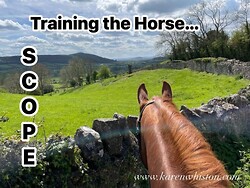
Safety First
There is little doubt that equestrian athletes and riders are high on the list of visitors to A&E, so the more we reduce the risk by focusing on safety the better for all.
The safer you feel,the more confident you will be.
I have already written an article on this, please feel free to check it out. https://www.karenwhiston.co.uk/safety-first
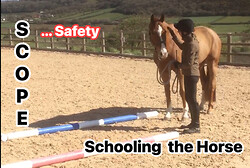
Comfort
A state of physical ease and freedom from pain or restraint, both physically and mentally.
Both horse and rider want to aim to have the feeling of comfort, to enable learning and allow confidence to excel together with trust.
For us as riders, not only being physically comfortable before you head to train your horse but mentally too….are you feeling comfortable doing the goal that you have set yourself and your horse?
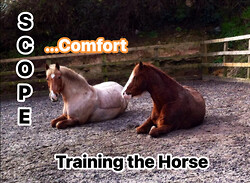
Are you comfortable with the training methods that you are using?
It is our responsibility to check the horses comfort, checking that the horse has no pain, regular checks from vets and physios are recommended, check the saddlery fits and that you are sitting as balanced as you can to allow the horse comfort when being ridden. Regular checks from vets, physio, saddlers and coaches.
Notice also if the horse is is mentally comfortable, this brings us on to O for Observation….
Observation
…the ability to notice this, especially significant details.
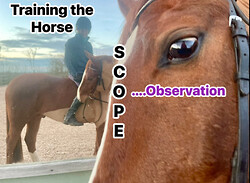
Observe your horse….
When you initially attend to him is he acting normal or looking subdued, tense,anxious or in pain?
How does he react to you approaching him?
What is his reaction to being tacked up, you mounting him and other interactions?
What is his body language when you are training….tight muscles? Eyes? Facial reactions?
Your horses body language may help you to decide how to train him that day or when to finish your training session.
Observe your environment…
For example.. Choose a quiet day to sit on your young horse for the first time or if it is windy, or dustbin day and your horse is sensitive to this, it maybe not be the day to ride out alone on the lanes.
Horses are masters of observation, they will see what emotions you are caring as soon as they spot you. Being prey animals, they have to be vigilant. They are very happy to coexist with us but in a very subconscious way, they know that we are predators so it is of their interest to observe our state of emotions.
Before you attend to your horse, notice how you are feeling, what emotions are you carrying?
Have you had a tough day?
Do you feeling annoyed or frustrated by a past event during your day?
Are you anxious about your day ahead?
How can you settle these emotions and become calmer for your horse?
Certainly the next will help…..
Presence
Essential qualities when schooling your horse are good timing, clear intentions and positive interactions.
Having greater presence, will help you notice the subtleties and improve the above qualities.
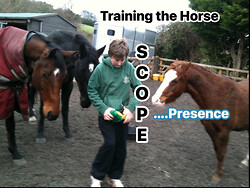
Presence of mind helps you to make good decisions and to act quickly and calmly in a difficult situation.
It serves you well when training the horse, improving your communication, giving clarity to the horse.
Helping your timing become more accurate.
Your intentions to be clearer.
Enabling the horse to understand your cues and become more compliant .
Being present for your horse allows you to notice the all the above. Therefore you and your horse will be safer, have fun learning and progressing together with comfort and confidence.
* Notice Your Surroundings and allow the horse to do the same, especially at the beginning of a schooling session.
* Focus on One Thing at a Time.
* Acceptance of where you and your horse are right now.
* Be Grateful For What You Have Now.
* Find Positive Social Support from other riders/coaches that understand you and your horses journey.
* Have a sense of curiosity without judgment.
* Practice Deep Breathing Exercises both on and off the horse
* Practicing Meditation can help you find that presence.
* Be Mindful of Everything You Do
More presence will help you control your energy,, our last word in our acronym, this is a useful tool when training horses!
Energy
Good horsemen can use their energy to train and communicate with the horse.
What is the definition of Energy?
It comes from Ancient Greek word ἐνέργεια (enérgeia) which means 'activity'
The dictionary says “the quantitative property that is transferred to a body or to a physical system, recognizable in the performance of work”
Also “Force or vigour of expression or the ability to cause some kind of change.”
Horses naturally use energy as a way of communication, not only emotions, intentions but also energy from their environment; birds or other animals, like deer, knowing whether to rest or be ‘on guard’.
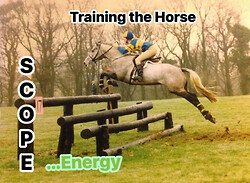
When training each individual horse your energy may change regularly during the schooling session depending on the horses state of mind and reactions in the moment, also what you are try to communicate.
If you are asking a a quiet, sleepy horse to move forward, you may up your energy quite significantly but if you used the same energy to move a sensitive or excited horse, you may have more than you bargained for!
When you ask a horse to stop or slow down, you will lower your energy.
Horses react to another horse swishing her tail, often meaning “back of or I will kick you!” They learn this language very early in their lives.
When training foals or horses ‘In hand’ that instinctively push into pressure, I will use the energy of a rope to help the horse understand how to move and then layer in pressure and release.
This often prevents the horses fight response which could create a tug of war or worse!
More about how to do this another day.
I encourage my students to imagine their energy like an orchestra playing a tune…there are times when you need lots of energy, drums, fast beat and all instruments playing to motivate the horse but other times when there is a pause or very slow quiet music and in a single schooling sessions you may be composing some masterpieces!
What would your orchestra be playing when you school your horse?
There is so much I could write about energy when training horses but we will leave this for another time.
…………………
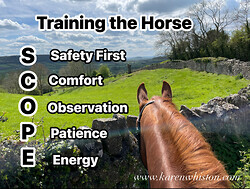
I hope that this gives you food for thought about how you are training your horse and helps your SCOPE for progress!
Please feel free to share them to anyone who may be interested and let me know how you get on and if I can help in anyway.
We have developed this acronym to enable food for thought, enabling you to grow as a rider/trainer/competitor/guardian to your horse, helping with confidence and ability of both horse and rider to progress.

Safety First
There is little doubt that equestrian athletes and riders are high on the list of visitors to A&E, so the more we reduce the risk by focusing on safety the better for all.
The safer you feel,the more confident you will be.
I have already written an article on this, please feel free to check it out. https://www.karenwhiston.co.uk/safety-first

Comfort
A state of physical ease and freedom from pain or restraint, both physically and mentally.
Both horse and rider want to aim to have the feeling of comfort, to enable learning and allow confidence to excel together with trust.
For us as riders, not only being physically comfortable before you head to train your horse but mentally too….are you feeling comfortable doing the goal that you have set yourself and your horse?

Are you comfortable with the training methods that you are using?
It is our responsibility to check the horses comfort, checking that the horse has no pain, regular checks from vets and physios are recommended, check the saddlery fits and that you are sitting as balanced as you can to allow the horse comfort when being ridden. Regular checks from vets, physio, saddlers and coaches.
Notice also if the horse is is mentally comfortable, this brings us on to O for Observation….
Observation
…the ability to notice this, especially significant details.

Observe your horse….
When you initially attend to him is he acting normal or looking subdued, tense,anxious or in pain?
How does he react to you approaching him?
What is his reaction to being tacked up, you mounting him and other interactions?
What is his body language when you are training….tight muscles? Eyes? Facial reactions?
Your horses body language may help you to decide how to train him that day or when to finish your training session.
Observe your environment…
For example.. Choose a quiet day to sit on your young horse for the first time or if it is windy, or dustbin day and your horse is sensitive to this, it maybe not be the day to ride out alone on the lanes.
Horses are masters of observation, they will see what emotions you are caring as soon as they spot you. Being prey animals, they have to be vigilant. They are very happy to coexist with us but in a very subconscious way, they know that we are predators so it is of their interest to observe our state of emotions.
Before you attend to your horse, notice how you are feeling, what emotions are you carrying?
Have you had a tough day?
Do you feeling annoyed or frustrated by a past event during your day?
Are you anxious about your day ahead?
How can you settle these emotions and become calmer for your horse?
Certainly the next will help…..
Presence
Essential qualities when schooling your horse are good timing, clear intentions and positive interactions.
Having greater presence, will help you notice the subtleties and improve the above qualities.

Presence of mind helps you to make good decisions and to act quickly and calmly in a difficult situation.
It serves you well when training the horse, improving your communication, giving clarity to the horse.
Helping your timing become more accurate.
Your intentions to be clearer.
Enabling the horse to understand your cues and become more compliant .
Being present for your horse allows you to notice the all the above. Therefore you and your horse will be safer, have fun learning and progressing together with comfort and confidence.
* Notice Your Surroundings and allow the horse to do the same, especially at the beginning of a schooling session.
* Focus on One Thing at a Time.
* Acceptance of where you and your horse are right now.
* Be Grateful For What You Have Now.
* Find Positive Social Support from other riders/coaches that understand you and your horses journey.
* Have a sense of curiosity without judgment.
* Practice Deep Breathing Exercises both on and off the horse
* Practicing Meditation can help you find that presence.
* Be Mindful of Everything You Do
More presence will help you control your energy,, our last word in our acronym, this is a useful tool when training horses!
Energy
Good horsemen can use their energy to train and communicate with the horse.
What is the definition of Energy?
It comes from Ancient Greek word ἐνέργεια (enérgeia) which means 'activity'
The dictionary says “the quantitative property that is transferred to a body or to a physical system, recognizable in the performance of work”
Also “Force or vigour of expression or the ability to cause some kind of change.”
Horses naturally use energy as a way of communication, not only emotions, intentions but also energy from their environment; birds or other animals, like deer, knowing whether to rest or be ‘on guard’.

When training each individual horse your energy may change regularly during the schooling session depending on the horses state of mind and reactions in the moment, also what you are try to communicate.
If you are asking a a quiet, sleepy horse to move forward, you may up your energy quite significantly but if you used the same energy to move a sensitive or excited horse, you may have more than you bargained for!
When you ask a horse to stop or slow down, you will lower your energy.
Horses react to another horse swishing her tail, often meaning “back of or I will kick you!” They learn this language very early in their lives.
When training foals or horses ‘In hand’ that instinctively push into pressure, I will use the energy of a rope to help the horse understand how to move and then layer in pressure and release.
This often prevents the horses fight response which could create a tug of war or worse!
More about how to do this another day.
I encourage my students to imagine their energy like an orchestra playing a tune…there are times when you need lots of energy, drums, fast beat and all instruments playing to motivate the horse but other times when there is a pause or very slow quiet music and in a single schooling sessions you may be composing some masterpieces!
What would your orchestra be playing when you school your horse?
There is so much I could write about energy when training horses but we will leave this for another time.
…………………

I hope that this gives you food for thought about how you are training your horse and helps your SCOPE for progress!
Please feel free to share them to anyone who may be interested and let me know how you get on and if I can help in anyway.